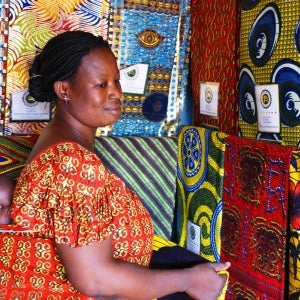Digital finance in Burkina Faso is relatively underdeveloped compared to other countries in the region. Still, despite this fact, the WAEMU Digital Financial Services Consumer Protection Lab’s national survey in Burkina Faso shows significant risks for users of digital financial services (DFS). More than three-quarters of Burkinabé respondents said they were exposed to at least one DFS-related challenge over the past year.
The challenges faced by DFS users in Burkina Faso and their exposure to risk are significant
DFS users face three categories of challenges: i) risks from using services, like fraud attempts or scams, ii) financial losses from actualized risks, and ii) challenges using services due to lack of customer skills. Although high, risks in Burkina Faso are actually slightly lower than in the region’s two most advanced digital services markets (Senegal and Côte d’Ivoire).
Burkinabé DFS users face three major risks
The most important is the insufficient quality of the GSM or internet network. According to our survey, 55% of users were exposed to network problems, with similar proportions in urban and rural areas. Poor network quality can prevent a transaction from being carried out, or interrupt its completion. This could result in the transaction being processed twice, causing the customer to lose money. Secondly, traceability is a significant concern, as 32% of users claim that they don’t systematically receive the SMS summarizing the transaction carried out, which could be due to poor network quality. Finally, 18% of users have been targeted by fraud and scam attempts.
Risk exposure is relatively similar across different user profiles, except for fraud and scams
Indeed, exposure to fraud and scams is higher among urban (11 percentage points (pp) higher than rural users) and men (6 pp higher than women) DFS users, probably because they are more active users. It is likely that this exposure is partly correlated with the level of service use. On the other hand, it’s important to note that very few of these fraud attempts result in loss of money (only 3% of users), and there is no difference in the percentage of people who have lost money according to user profiles.
Women and rural people need more assistance using DFS
According to the survey, the customers having the most difficulty navigating the USSD or app menu are women (17% vs. 12% of men) and rural customers (19% vs. 13% in urban areas). Men and customers in urban areas, on the other hand, get less help from agents to carry out their transactions. Interestingly, this user profile (male, urban) typically makes more errors on phone numbers or transaction amounts.
Agents play a positive role, with nearly one in two users claiming to have received help from an agent
Women, rural, and older users are more likely to seek help from agents. Agent assistance mainly covers understanding how to use the services (30%) and their costs (16%), as well as carrying out transactions from the account (17%) or from the user’s phone (28%). As in Côte d’Ivoire and Senegal, the vast majority of DFS users in Burkina Faso (89%), across all profiles, are indifferent as to the gender of the agent with whom they carry out their transactions.
“As we don’t know how to read, we give the phone to the agent who checks the message (when we’ve received money) and makes the withdrawal for us.” – Mobile money account user in Sabtenga
However, these same agents sometimes lack electronic units for deposits or cash for withdrawals. Additionally, they might refuse to process small-value transactions (26% of respondents have encountered this problem). This practice tends to discriminate against more vulnerable users who make smaller transactions.
The survey shows good transparency on transaction costs and an effective complaints mechanism
Only 5% of users complained about the lack of transparency around transaction costs, and most users used the complaint channels offered by the providers, with a very high level of resolution (94% of cases when the provider was contacted).
Lastly, it is worth noting that the efforts made by mobile money providers to better protect DFS users in Burkina Faso over the last few years have paid off and reflect in lower risks faced by DFS users in the country compared to Côte d’Ivoire and Senegal (even though they remain high). Indeed, to ensure and maintain the trust of customers, many of whom have little or no literacy skills, responsive and customer-oriented complaint-handling mechanisms have been put in place, along with good communication. To better combat fraud and scams support effected customers, they have introduced several measures, including a dedicated hotline, intensive awareness-raising campaigns across various channels, and close collaboration with the gendarmerie and police.
We can draw some valuable conclusions from this study to make the digital finance ecosystem more responsible in Burkina Faso
At the workshop presenting survey results, key actors in the digital finance ecosystem identified possible solutions along four main themes:
- Enhance the digital capabilities of the most vulnerable users, notably by facilitating their user experience through the development of local-language audio interfaces, or by designing and deploying local-language digital literacy training campaigns via community players and other communication channels adapted to these users.
- Reduce the risks with agents and strengthen their role in supporting customers, particularly women and rural populations. DFS providers were encouraged to reinforce the training of their agents on their roles and responsibilities, and to address the problem of refusal of small-value withdrawals, which penalizes the most vulnerable users.
- Increase women’s digital financial inclusion, notably by developing solutions and digital services tailored to women’s specific needs, and by expanding agent networks.
- Reduce DFS users’ exposure to fraud and scams, in particular by strengthening the capacities of state structures in charge of fighting fraud, such as the National Anti-Fraud Coordination and the National Anti-Crime Brigade, reinforcing collaboration, and stepping up law enforcement.
Burkina Faso’s digital finance consultation framework, which brings together all stakeholders in the digital finance ecosystem and is coordinated by the Technical Secretariat for the Promotion of Financial Inclusion (ST-PIF), our partner in this survey, has already reviewed and approved an action plan based on these four themes. The plan highlights the need for greater collaboration between ecosystem actors and support from funding agencies. Some actions are already underway, such as ST-PIF’s interactive voice system, which delivers messages in local languages on topics like fraud prevention and how to access the complaints mechanism. With continued collaboration and support, these initiatives will strengthen financial inclusion and protect users, creating a more resilient digital finance ecosystem in Burkina Faso.


